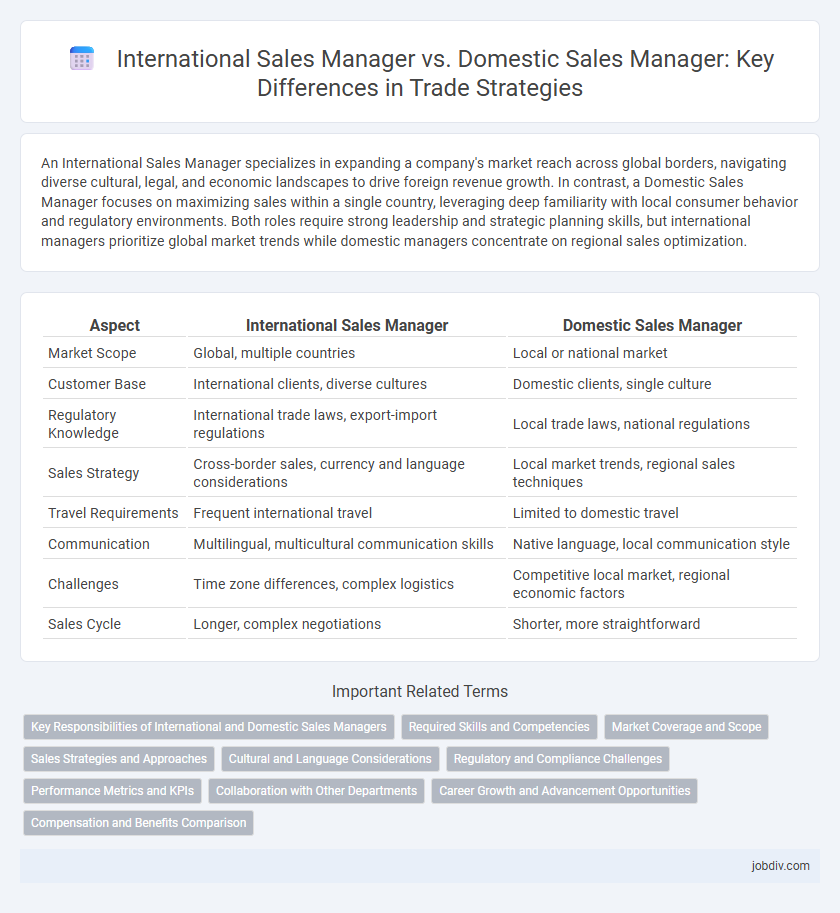An International Sales Manager specializes in expanding a company's market reach across global borders, navigating diverse cultural, legal, and economic landscapes to drive foreign revenue growth. In contrast, a Domestic Sales Manager focuses on maximizing sales within a single country, leveraging deep familiarity with local consumer behavior and regulatory environments. Both roles require strong leadership and strategic planning skills, but international managers prioritize global market trends while domestic managers concentrate on regional sales optimization.
Table of Comparison
| Aspect | International Sales Manager | Domestic Sales Manager |
|---|---|---|
| Market Scope | Global, multiple countries | Local or national market |
| Customer Base | International clients, diverse cultures | Domestic clients, single culture |
| Regulatory Knowledge | International trade laws, export-import regulations | Local trade laws, national regulations |
| Sales Strategy | Cross-border sales, currency and language considerations | Local market trends, regional sales techniques |
| Travel Requirements | Frequent international travel | Limited to domestic travel |
| Communication | Multilingual, multicultural communication skills | Native language, local communication style |
| Challenges | Time zone differences, complex logistics | Competitive local market, regional economic factors |
| Sales Cycle | Longer, complex negotiations | Shorter, more straightforward |
Key Responsibilities of International and Domestic Sales Managers
International Sales Managers oversee global market expansion, manage cross-cultural client relationships, and coordinate logistics across multiple countries to optimize export and import activities. Domestic Sales Managers focus on regional market development, strengthen local customer engagement, and implement sales strategies that comply with national regulations and market trends. Both roles require analyzing sales data and directing teams to achieve revenue targets within their respective geographical scopes.
Required Skills and Competencies
International Sales Managers require strong cross-cultural communication, foreign market knowledge, and proficiency in multiple languages to navigate global trade regulations and diverse customer needs. Domestic Sales Managers focus on in-depth understanding of local market trends, customer relationship management, and regional sales strategies. Both roles demand excellent negotiation skills, strategic planning, and the ability to analyze sales data for effective decision-making.
Market Coverage and Scope
An International Sales Manager oversees market coverage across multiple countries, managing diverse cultural and regulatory environments to expand global reach and optimize cross-border sales strategies. In contrast, a Domestic Sales Manager focuses on a single national market, developing deep local market insights and tailoring sales approaches to regional customer preferences and domestic competition. The scope for an International Sales Manager includes coordinating international logistics, currency variations, and compliance, while the Domestic Sales Manager concentrates on localized distribution channels and market penetration.
Sales Strategies and Approaches
International Sales Managers develop tailored sales strategies that account for cultural differences, local regulations, and global market trends, optimizing cross-border business growth. Domestic Sales Managers focus on deep market penetration and customer relationship management within a single country, leveraging local consumer behavior and distribution channels. Both roles require adapting sales approaches, but international managers emphasize global market diversification while domestic managers prioritize regional market dominance.
Cultural and Language Considerations
International Sales Managers must possess strong cross-cultural communication skills and fluency in multiple languages to effectively navigate diverse global markets and build relationships with international clients. In contrast, Domestic Sales Managers primarily focus on regional market knowledge and local language proficiency, which simplifies communication and reduces cultural barriers. Understanding cultural nuances and language differences is crucial for international sales strategies to enhance negotiation, customer trust, and market penetration.
Regulatory and Compliance Challenges
International Sales Managers navigate complex regulatory frameworks, including customs regulations, import-export controls, and varying compliance standards across multiple countries, requiring thorough knowledge of international trade laws and documentation. Domestic Sales Managers primarily focus on adhering to national regulations such as local consumer protection laws, tax codes, and industry-specific compliance requirements, which are more uniform and predictable within one country. Understanding these distinct regulatory and compliance challenges is essential for tailoring strategies that ensure legal adherence and minimize risks in both international and domestic markets.
Performance Metrics and KPIs
International Sales Managers are evaluated using performance metrics such as global revenue growth, cross-border client acquisition rates, and foreign market penetration percentages, emphasizing adaptability to diverse regulatory environments and cultural nuances. Domestic Sales Managers focus on KPIs including regional sales volume, customer retention rates, and local market share expansion, optimizing strategies within established national frameworks. Both roles prioritize sales forecast accuracy and average deal size, but international managers often incorporate currency fluctuation impacts and international logistics efficiency into their performance evaluations.
Collaboration with Other Departments
International Sales Managers coordinate closely with marketing, logistics, and finance teams to navigate global market regulations and optimize cross-border supply chains. Domestic Sales Managers work collaboratively with customer service, product development, and local distribution networks to enhance market penetration and adapt sales strategies to regional consumer behavior. Effective interdepartmental collaboration for both roles drives revenue growth and aligns sales objectives with overall business goals.
Career Growth and Advancement Opportunities
International Sales Managers gain broader career growth by navigating global markets, expanding cross-cultural negotiation skills, and managing diverse international teams. Domestic Sales Managers develop deep market expertise and local client relationships, which can lead to leadership roles within regional sales divisions. The global exposure of International Sales Managers typically offers faster advancement to executive positions compared to the more localized progression of Domestic Sales Managers.
Compensation and Benefits Comparison
International Sales Managers typically receive higher compensation packages due to the complexity and scope of managing cross-border sales, often including bonuses tied to global market performance and currency fluctuation allowances. Domestic Sales Managers usually have more stable salaries supplemented by region-specific commissions and benefits such as local travel reimbursements and healthcare tailored to national standards. Benefits for International Sales Managers often extend to expatriate allowances, international health insurance, and relocation support, reflecting the greater demands and challenges of operating in multiple countries.
International Sales Manager vs Domestic Sales Manager Infographic

 jobdiv.com
jobdiv.com